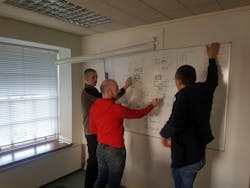“Quiet, isn’t it?”
That’s the comment quite a few folks have made on visiting our office, which is located in an old stone-built building, beside a park, in the Leith area of the ancient city of Edinburgh, Scotland’s capital city. The Network Innovation Centre in Edinburgh is where Abaco’s OpenWare switch management software is developed.
There’s really not much to see, though. Our software developers are typing and looking at screens, and there are a couple of areas filled with very techie-looking equipment – mainly the computers and communications systems used to develop and test our software. The noisier equipment is off in a separate lab, keeping the office quieter.
Unique
The people based here are mainly developing and supporting our OpenWare software, which is part of what makes Abaco unique in the mil/aero market for embedded systems. Designed to provide management for the Ethernet switches that sit at the heart of most modern military computing solutions, it is a combination of our own in-house developed code sitting in an environment of Open Source code, using Linux/GNU software.
This means that the skills of the team here (and the few guys who work remotely) cover a wide range:
- Communications protocols
- Processor and ASIC devices
- Operating systems
- Low-level device drivers
- Boot loaders
- High-level applications
The OpenWare product has been developed over nearly 20 years by this team - and some of these folks have worked on it from the start. It now consists of many hundreds of thousands of lines of our own code – nearly all in the C language, and many of the team have their own specialist areas. The developers range in levels of experience in the software industry; a few are fairly recent graduates, while others have been knocking out C code for more years than they would like to admit!
Co-operatively
Most of our projects are done quite co-operatively – so a visitor would occasionally see a group of guys in one of the meeting rooms, scribbling on a whiteboard while discussing the best approaches and solutions to the current technical challenge. The projects tend to be for two main reasons – either to support new hardware developments, or to provide new software or communication features across the whole range of our hardware products. So, there will also at times be conversations, typically as conference calls, with hardware developers or with customers. Many of these customers are overseas, so some of the conference calls happen in the afternoon or evening, to overlap with US time zones.
At times, one or two of the engineers will be seen over in the lab area, connecting new equipment, changing the complex cable configurations required for our test regimes, or trying to figure out why something isn’t working!
However, not all of Edinburgh is purely focused on OpenWare development. A couple of the engineers have a wider brief and do very customer-facing software support across a wider range of products. This widens the scope of things worked on by the whole team, and lets us cover even more technologies, skills and interests.
There are often topics less related to work being talked over around the corner, in the small area where we have our lunch or tea breaks. But generally, things are very quiet as these folk sit, think and type. This leads most visitors to appreciate the quiet atmosphere in the office.
About the Author

